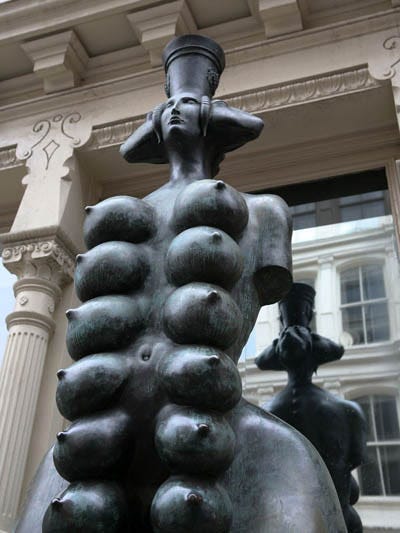Recorded music is an addictive superstimuli that causes us grave psychological harm, both individually and collectively. Music should only be performed live, and even then it should be reserved for special occasions (i.e. music should be regarded as sacred).
Out of all of my 20 modern heresies, this one was the most commented upon and the most controversial by a wide margin, much to my surprise.
Some people thought I might be onto something:






Anddddd the haters:

Lest I be taken for some musical philistine: I listen to music most days, I was an avid guitar player for about five years of my life, and I still regularly attend concerts of various genres. And I am fun at parties, fuck you Jessica.


Fuck twitter and fuck your tweet too, Dadlord!
I won't say that I had some extensive well-thought out argument behind the heresy when I wrote it, more of just a vague intuition, but since then I've encountered a few interesting sources that speak to the idea that I suppose I was gesturing toward. This will be less of an essay and more of a “working notes” post, and as such will feature lengthy quotes and be a little less expository than my typical writing. Take it for what it’s worth, YMMV, and all that jazz.


We were not meant to see ourselves like this, from the outside. Our first ancestors would boil the flesh off the bones when one of the tribe died, and rub them with red ochre. They painted vast herds of animals in their caves, flowing and alive, but they never depicted human beings except as scrawny stick-figures: they knew that a depiction can be fatal to the person depicted. Even now, the front-facing camera on your phone automatically flips the image, so it looks like the familiar creature you see in the mirror, and not like the strange uncomfortable thing you actually are.
— Sam Kriss, “Alex Jones is a Beautiful Women”
It’s hard not to look at some of these Instagram models-influencers whose whole life revolves around taking pictures/videos of themselves and not think that their souls were stolen, or at least terribly deranged.
Consider the case of Nicholas Perry.
In 2016, 24 year old Nicholas Perry wanted to be big online. He started uploading videos to his YouTube channel in which he pursued his passion—playing the violin—and extolled the virtues of veganism. He went largely unnoticed.
A year later, he abandoned veganism, citing health concerns. Now free to eat whatever he wanted, he began uploading mukbang videos of himself consuming various dishes while talking to the camera, as if having dinner with a friend.
These new videos quickly found a sizable audience, but as the audience grew, so did their demands. The comments sections of the videos soon became filled with people challenging Perry to eat as much as he physically could. Eager to please, he began to set himself torturous eating challenges, each bigger than the last. His audience applauded, but always demanded more. Soon, he was filming himself eating entire menus of fast food restaurants in one sitting.
In some respects, all his eating paid off; Nikocado Avocado, as Perry is now better known, has amassed over six million subscribers across six channels on YouTube.

The idea is that something similar happens when we record music. Videos, photographs, and music recordings all freeze what was a fleeting moment of consciousness and turn it into an object that can be endlessly beheld and obsessed over.
If a photograph can steal your soul, what can a band do? Think of obsessive fans like K-pop sasaengs or the “Dead Heads”, those Grateful Dead superfans/music worshipper-nomads who followed the band across the country and the world.
“Before the term was invented, The Grateful Dead became one of the first cult acts in music. Although not as mainstream as other psychedelic bands, they were the leaders of the Haight-Ashbury music scene and had an intense following that started in San Francisco and eventually spread.”
“cult act”—yes, literally.

The relationship between music and religion has been a long-standing fascination of mine. My only discussion of this topic so far was my essay “Morning of the Mutants”, a book review about those castrated super-singers (the castrati) produced by the Catholic church in Italy from the 16th century to the end of the 19th century. What was striking (and horrifying) about the castrati was how they were used by the church and by kings, “as a kind of aesthetic-emotional technology”, one that made power, “immediate, intimate, empathetic, charming, and palpable”.
Strangely, the castrati were not the first to be involved in this music-religion-castration love triangle.
All quotes from wikipedia (emphasis mine).
Cybele is an Anatolian mother goddess; she may have a possible forerunner in the earliest neolithic at Çatalhöyük, where statues of plump women, sometimes sitting, have been found in excavations. Phrygia's only known goddess, she was probably its national deity. Greek colonists in Asia Minor adopted and adapted her Phrygian cult and spread it to mainland Greece and to the more distant western Greek colonies around the 6th century BC.
Romans knew Cybele as Magna Mater (“Great Mother”), or as Magna Mater deorum Idaea (“great Idaean mother of the gods”). Rome officially adopted her cult during the Second Punic War (218 to 201 BC), after dire prodigies, including a meteor shower, a failed harvest and famine, seemed to warn of Rome's imminent defeat. The Roman Senate and its religious advisers consulted the Sibylline oracle and decided that Carthage might be defeated if Rome imported the Magna Mater of Phrygian Pessinos (note: Pessinos was a city). As this cult object belonged to a Roman ally, the Kingdom of Pergamum, the Roman Senate sent ambassadors to seek the king's consent; en route, a consultation with the Greek oracle at Delphi confirmed that the goddess should be brought to Rome. The goddess arrived in Rome in the form of Pessinos’ black meteoric stone…Pessinos’ stone was later used as the face of the goddess’ statue. In due course, the famine ended and Hannibal was defeated.
You could probably guess from the context, but to the Romans, a “prodigy” meant something very different than what it means to us now.
Prodigia were unnatural deviations from the predictable order of the cosmos. A prodigium signaled divine displeasure at a religious offense and must be expiated to avert more destructive expressions of divine wrath. Compare ostentum and portentum, signs denoting an extraordinary inanimate phenomenon, and monstrum and miraculum, an unnatural feature in humans.
Prodigies were a type of auspicia oblativa; that is, they were "thrust upon" observers, not deliberately sought. Suspected prodigies were reported as a civic duty. A system of official referrals filtered out those that seemed patently insignificant or false before the rest were reported to the senate, who held further inquiry; this procedure was the procuratio prodigiorum. Prodigies confirmed as genuine were referred to the pontiffs and augurs for ritual expiation. For particularly serious or difficult cases, the decemviri sacris faciundis could seek guidance and suggestions from the Sibylline Books.
The number of confirmed prodigies rose in troubled times. In 207 BC, during one of the worst crises of the Punic Wars, the senate dealt with an unprecedented number, the expiation of which would have involved “at least twenty days” of dedicated rites. Major prodigies that year included the spontaneous combustion of weapons, the apparent shrinking of the sun's disc, two moons in a daylit sky, a cosmic battle between sun and moon, a rain of red-hot stones, a bloody sweat on statues, and blood in fountains and on ears of corn. These were expiated by the sacrifice of “greater victims”. The minor prodigies were less warlike but equally unnatural; sheep became goats; a hen become a cock, and vice versa. The minor prodigies were duly expiated with “lesser victims”. The discovery of a hermaphroditic four-year-old child was expiated by its drowning and a holy procession of 27 virgins to the temple of Juno Regina, singing a hymn to avert disaster; a lightning strike during the hymn rehearsals required further expiation. Religious restitution was proved only by Rome's victory.
What I find interesting about this is how the prodigies and prophecies were used as a sort of mass psychological manipulation (a collective placebo effect). Is everyone’s morale low because there is a famine and you are losing the war? Just declare that you will win the war if you import this goddess from another city, then import said goddess with much fanfare and celebration, and voila!—everyone believes that victory is inevitable, morale improves, and then you in fact do have a better chance of winning.
And the castration:
A gallus (pl. galli) was a eunuch priest of the Phrygian goddess Cybele (Magna Mater in Rome) and her consort Attis, whose worship was incorporated into the state religious practices of ancient Rome. The Galli’s voluntary emasculation in service of the goddess was thought to give them powers of prophecy.
According to Livy, it [the aforementioned physical instantiation of the Cybele] was brought to the Temple of Victory on the Palatine Hill on the day before the Ides of April, and, from then on, the anniversary was celebrated as the Megalesia on April 4–10 with public games, animal sacrifices, and music performed by the galli. Over a hundred years later (according to Plutarch), when the Roman general Marius planned to fight the Germanic tribes, a priest of the galli named Bataces prophesied Roman victory and consequently the Senate voted to build a victory temple to the goddess.
The galli castrated themselves during an ecstatic celebration called the Dies sanguinis, or “Day of Blood”, which took place on March 24. On this day of mourning for Attis, they ran around wildly and disheveled. They performed dances to the music of pipes and tambourines, and, in an ecstasy, flogged themselves until they bled. This was followed by a day of feasting and rest.
A sacred feast was part of the initiation ritual. Firmicus Maternus, a Christian who objected to other religions, revealed a possible password of the galli: “I have eaten from the timbrel (a kind of tambourine); I have drunk from the cymbal; I am become an initiate of Attis.”
The signs of their office have been described as a type of crown, possibly a laurel wreath, as well as a golden bracelet known as the occabus. They generally wore women's clothing (often yellow), and a turban, pendants, and earrings. They bleached their hair and wore it long, and they wore heavy makeup. They wandered around with followers, begging for charity, in return for which they were prepared to tell fortunes.










Wow. In a lot of ways I agree with you about music. I have been thinking much of the same thing lately about narrative. What I mean is that narrative concentrates, for example, all of the interesting parts of life into say 30 minutes. And I think that parts of our humanity, I won't pretend to know which ones, may be getting overloaded by this. They sort of can't fully digest all of the story that we are putting into them. It would have been different when the story had to be a live performance, because obviously the consumption would have been much more limited.
Have you ever noticed how sometimes when reading a book after a particularly eventful sequence you might feel emotionally exhausted, and how movies used to affect us in the same way, and how we are getting numb to all of that? Like music, narrative is a more powerful drug than we suspect. Maybe our ancestors limited it not because they couldn't make it as available as we do but because they chose to?
As an aside, to bring up the Galli and the religious significance of genital mutilation is a brave choice. I hope that you haven't unintentionally summoned up a storm.
Would sure be nice if potential psychological harm from listening to recorded music was the most pressing problem facing humanity. Or was even in the top five!